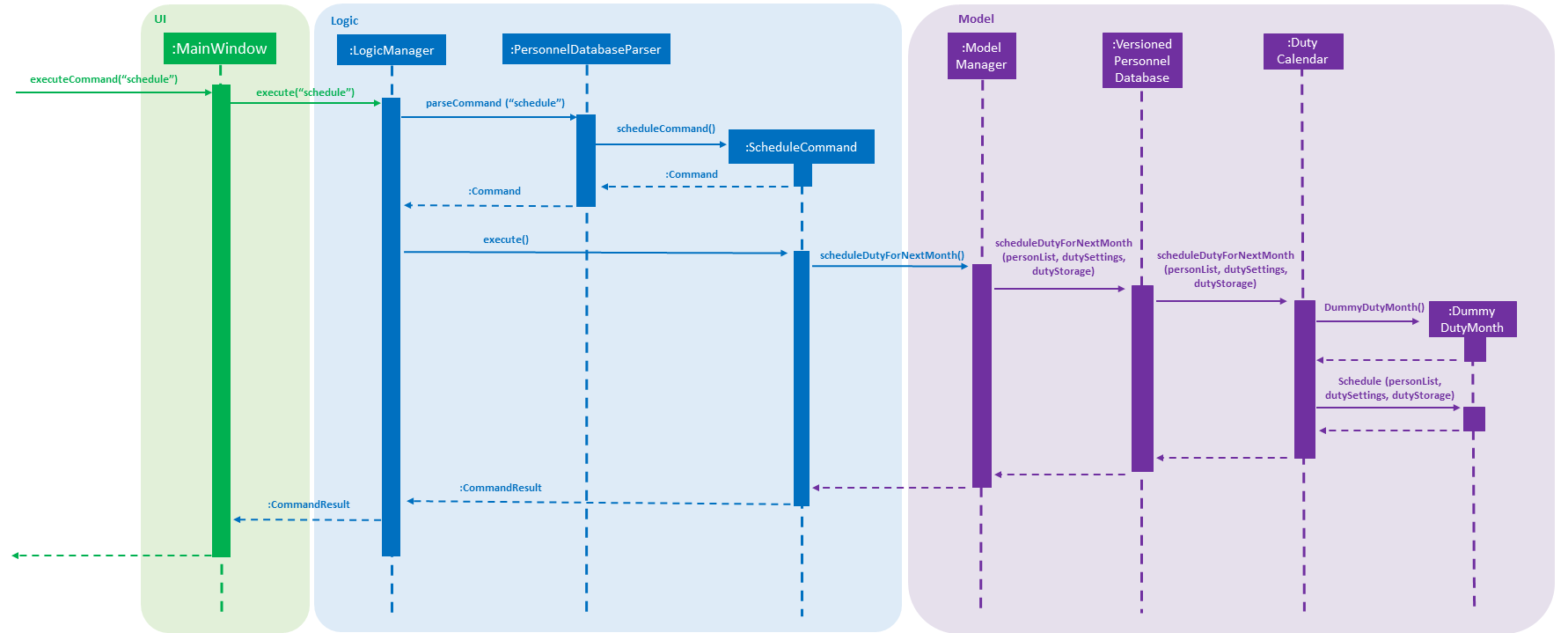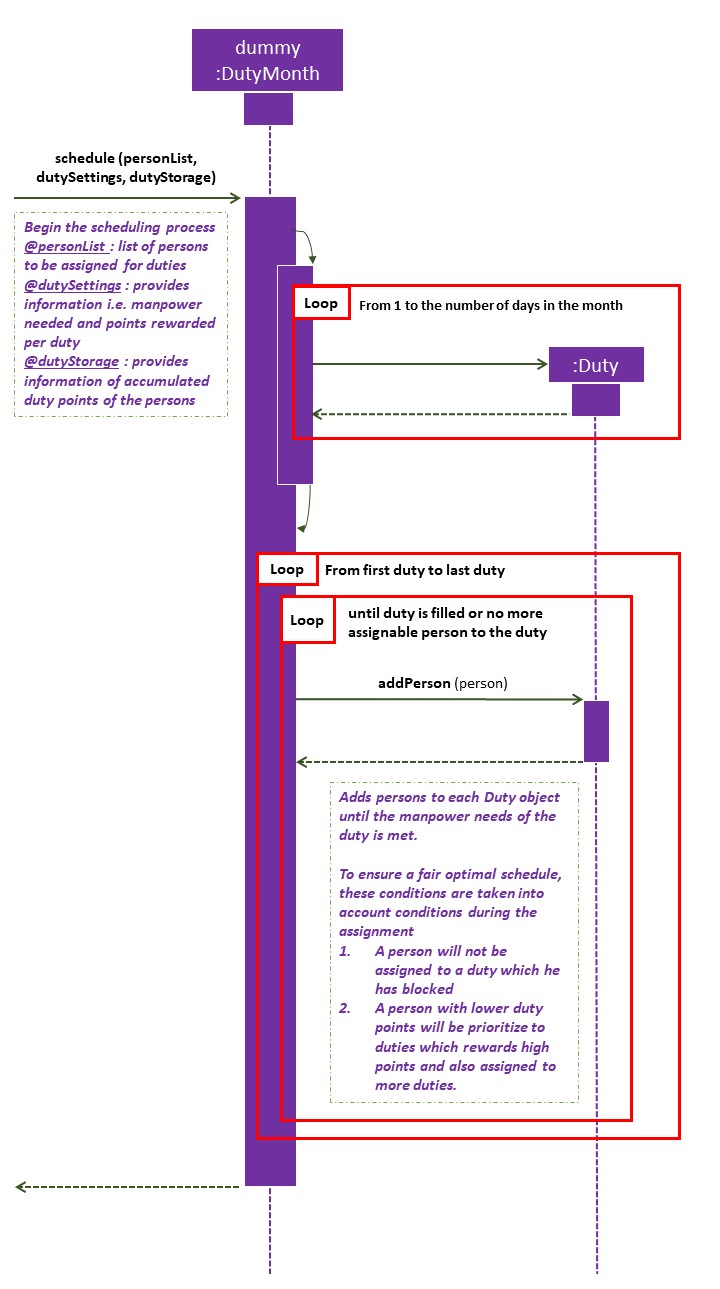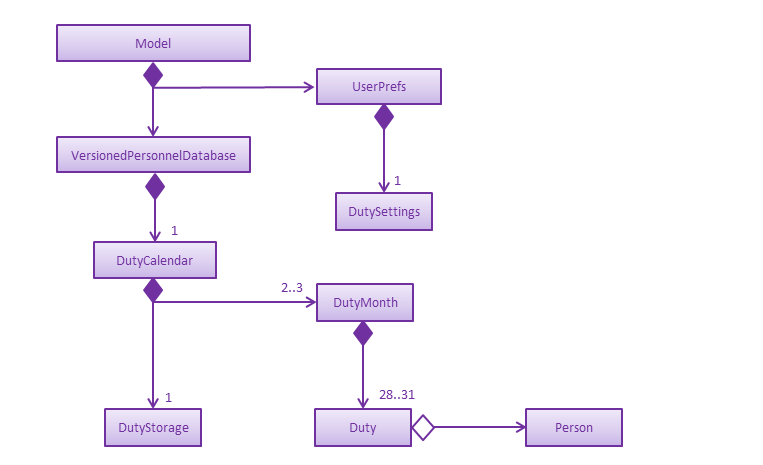Overview
MINDEF Duty Planner is a desktop application used to help military units in the Singapore Armed Forces organise and plan monthly duties for their servicemen. It has various features and functions for administrator (i.e. commander) as well as the duty personnel (i.e. servicemen). The user interacts with the application using a Command Line Interface (CLI) with a Graphic User Interface (GUI) created with JavaFX. It is written in Java, and has about 10kLoC.
The Duty Planner is modified and upgraded from SE-EDU Address Book 4.
Summary of contributions
-
Major enhancement: Creation of the duty package module
-
What it does: The duty package consists of classes (i.e. Duty, DutyMonth, DutySettings, DutyStorage) responsible for setting up the duties of a month and assigning them to persons, as well as contains vital functions needed for the duty features to be implemented.
-
Duty: A class that characterizes the attributes of a duty including the exact date, points awarded, manpower needed and a list of person eventually being assigned to that duty. -
DutyMonth: Represents a month in the calendar and is the main driver class behind the scheduling of duties. It instantiates all duties and assigns each duty to persons. Stores vital information such as the list of scheduled duties and the blocked dates of each person. -
DutySettings: Contains information about the manpower needed and points assigned to duties based the day of the week. Enable modification to the the manpower needed and points assigned to each duty based on the day of the week. -
DutyStorage: Accumulates and stores the duty points and duty records of all the persons.
-
-
Justification: The duty package provides the backend support for all duty-related features and commands.
-
Highlights: The package contain functions assessed by many commands (i.e. BlockDateCommmand, ScheduleCommand, DutySettingsCommand, ViewCommand, PointsCommand, RewardCommand, PenalizeCommand).
-
Credits: {Teammate Yoon Ki Hyun for working together on the DutyMonth and Duty}
-
-
Major enhancement:
ScheduleCommandandConfirmScheduleCommand-
What it does: The schedule command that invokes the schedule algorithm to generate a viable duty allocation for the upcoming month. The confirm command finalizes the schedule and updates the existing duty points of each person.
-
Justification: Enable duties to be created and scheduled.
-
Highlights: The main feature of the application.
-
-
Major enhancement:
SettingsCommand-
What it does: Enable the administrator to adjust the desired manpower for duties based on the day of the week. Enable the administrator to adjust the points to be awarded for doing duties based on the duty of the week.
-
Justification: Allows the administrator to have flexibility to change the duty allocation system.
-
Highlights: Need to ensure that the scheduling algorithm is compatible with adjustable duty points and duty capacities.
-
-
Major enhancement:
PointsCommand-
What it does: Enable the administrator to view duty points and duty records of all persons.
-
Justification: Allows more duty-related information to be viewed.
-
-
Major enhancement:
RewardCommandandPenalizeCommand-
What it does: Enable the administrator to reward and penalize points from a person or a list of persons.
-
Justification: Allows the administrator the autonomy to manually update duty points.
-
Highlight: Enabled us to better test the effectiveness of the scheduling algorithm in obscure situations (i.e. one person having points significantly higher or lower points than the rest).
-
-
Minor enhancement: Storage for
DutyStorage—JsonAdaptedDutyStorage-
What it does: Ensures that duty points and duty records are saved in the system when the application closes.
-
Justification: This allows users to open the application with previously saved duty information instead of resetting each time the application reopens.
-
-
Minor enhancement:
DateUtilCommon-
What it does: A class that contains static methods to assist in validation of date parameters and other date related functions.
-
Justification: Contains commonly used functions that aids the developers and prevent duplicate codes.
-
-
Code contributed: [Code]
-
Project management:
-
Managed releases
v1.1
-
-
Documentation:
-
Major updates to the User Guide:
https://github.com/yjpan47/main/blob/master/docs/UserGuide.adoc -
Updated Developer Guide to include Duty Package:
https://github.com/yjpan47/main/blob/master/docs/DeveloperGuide.adoc
-
Contributions to the User Guide
Given below are sections I contributed to the User Guide. They showcase my ability to write documentation targeting end-users. |
View duty points : points
Displays the duty points accumulated by each person. Additional records of each person (i.e. duties allocated, points rewarded, points penalized) can also be viewed.
Format: points [INDEX]
Calling the command without index (points) provides a list of all persons and their accumulated duty points while calling the command with index (points INDEX) provides the accumulated duty points of an individual person and his record (i.e. duties, points rewarded, points penalized).
|
Examples:
-
points 2
Retrieves the duty points of the 2nd person on the contact list, as well as his records with information such as duties allocated, points rewards and points penalized. -
points
Displays a list of all persons and their respective duty points.
Reward points : reward
Manually reward duty points to a person or a list of persons.
Format: reward i/INDEX [INDEX] [INDEX] … p/POINTS
-
Points rewarded can range from 1 to 100 for each command call.
Examples:
-
reward i/1 2 4 5 p/20
Rewards 20 points each to the 1st, 2nd, 4th and 5th person on the contact list. -
reward i/3 p/4
Rewards 4 points to the 3th person on the contact list.
Penalize points : penalize
Manually penalize duty points for a person or a list of persons.
Format: penalize i/INDEX [INDEX] [INDEX] … p/POINTS
-
Points penalized can range from 1 to 100 for each command call.
-
The duty points of a person can fall to less than zero.
Examples:
-
penalize i/1 2 4 5 p/20
Penalize 20 points each for the 1st, 2nd, 4th and 5th person on the contact list. -
penalize i/3 p/4
Penalize 4 points for the 3th person on the contact list.
View and edit duty settings (points and manpower needed for each day of the week) : settings
View and edit duty settings. Duty settings refer to the manpower needed and points rewarded for each duty based on the day of the week (e.g. Sunday, Monday, etc)
Format: settings [d/DAYOFWEEK m/MANPOWER p/POINTS]
-
DAYOFWEEK: Mon / Tue / Wed / Thur / Fri / Sat / Sun (full spelling e.g. Monday, Tuesday etc. works as well) -
MANPOWER: Number ranging from 1 to 10 -
POINTS: Number ranging from 1 to 100
Calling the command settings alone displays the current duty settings while calling the command settings with the day of the week, manpower and points enables the editing of the duty settings.
|
| The updated duty settings will only take effect the next time a schedule is confirmed. If schedule for next month has already been confirmed, the confirmed schedule will still follow the specifications of the previous duty settings. |
Examples:
-
settings
Displays the duty settings - for each day of the week, the manpower needed and points to be rewarded. -
settings d/sun m/3 p/4
Duty settings edited. Sunday duties now require 3 persons and 4 points will be rewarded to each person assigned a Sunday duty. -
settings d/monday m/2 p/3
Duty settings edited. Monday duties now require 2 persons and 3 points will be rewarded to each person assigned a Monday duty.
Schedule duties : schedule
Creates a viable duty schedule for the upcoming month. The scheduling algorithm takes into account the manpower needs of each duty day, blocked dates of each person, the current duty points of each person and points rewarded for each duty to generate a fair schedule.
Format: schedule
The algorithm is optimized such that a person with low duty points will be allocated to duties which rewards high points and possibly be given more duties. It automatically attempts to balance out the points of each person after scheduling.
The command schedule merely provides a viable duty schedule and does not confirm the schedule to the calendar. Duty points have also yet been updated. The schedule generated is not deterministic and calling schedule again will regenerate a new duty schedule.
|
Once a satisfactory duty schedule is generated, the administrator can go ahead to confirm the duty schedule. (See 4.4.10 Confirm a schedule)
Calling schedule after next month’s duties have already been confirm will only display the confirmed duty schedule.
Contributions to the Developer Guide
Given below are sections I contributed to the Developer Guide. They showcase my ability to write technical documentation and the technical depth of my contributions to the project. |
Duty Package
Duty Month
DutyMonth class represents all duty-related information for a particular month. It contains the following key information:
-
The blocked days of every person for duties in the month.
-
A list of scheduled duties implemented as a
Dutyobject list-
At the construction of the
DutyMonth, the list is empty. -
When the
schedulemethod is called,Dutyobjects are be instantiated and appended to the list. The list will contain the same number ofDutyobjects as the number of days in the month.
-
-
A boolean
confirmstate — denoting whether the duty allocation for the month is confimed.
DutyMonth class contains the following key operations:
-
DutyMonth#addBlockedDay(person, day)— adds a blocked day to a particular person, indicating that the person cannot be assigned duty on that particular day of the month. -
DutyMonth#removeBlockedDays(person)— remove all blocked days for a particular person, indicating that the person can now be assigned duty on any day of the month. -
DutyMonth#schedule(personList, dutySettings, dutyStorage)— invokes the scheduling alogorithm. Generate all duties for the particular month and assign person from personList to the duties. -
DutyMonth#confirm()— sets the state of theDutyMonthto confirmed. Duty allocation is finalized.
Duty
Duty class represents a duty for a day. It contains the following information:
-
List of
Personallocated to the duty. -
Capacity — number of persons needed for the duty.
-
Points — number of points to be rewarded to each person assigned to the duty.
Duty Storage
DutyMonth class stores the accumulated duty points and duty records of every person. It has the following key operations:
-
DutyStorage#update(dutieslist)— updates the duty points and records from a list of scheduled duties. Used when schedules are confirmed and finalized. -
DutyStorage#undo(dutieslist)— restore to previous state of duty points and records. Used when previous confirmed duty schedule has to be undone. -
DutyStorage#reward(person, point)— adds duty points to a particular person. -
DutyStorage#penalize(person, point)— deducts duty points from a particular person.
Duty Settings
DutySettings class is an attribute under UserPrefs. It stores information regarding the manpower needed and duty points to be rewarded for each duty based on the day of the week.
It is accessed when duties are generated to ensure the appropriate attributes (capacity and points) given to each duty.
Schedule Command
The schedule command is called by the admin to generate a viable duty schedule for the upcoming month.

The sequence diagram above shows how the schedule operation works.
It is worth noting that schedule operation does not finalize the duty schedule for next month. Therefore, dutyCalendar has to instantiates a new dummyNextMonth for the operation.
Subsequent calling of the confirm operation will allow the nextMonth object to point to the latest dummyNextMonth, and invoke dutyStorage to update duty points and records.
Schedule Algorithm

The sequence diagram above provides a simplified illustration of the schedule method in DutyMonth.
To ensure a system where duties are allocated fairly,
-
We employ a point system where each person can gain points by doing duties.
-
The points awarded are cumulative — can be carried over to the next month. Duty points accumulated are stored in
DutyStorage. -
Each duty is worth a certain number of points and a person gains that amount of points by doing that duty. The points allocated to each duty is retrieved from
DutySettings. -
Before the
schedulecommand is called, each person has the opportunity to indicate the days he are unavailable for duty.
Approach
-
Generate a list of
Dutyobjects sorted by their points in descending order. -
Generate a priority queue of all
Personobjects, queued based on their accumulated duty points with the lowest at the head of the queue. -
Iterate through the list of
Dutyobjects. At each iteration,-
Poll the priority queue of
Personcontinuously until an instance of a compatible duty-person pairing. -
A compatible pairing consists of conditions such as the
Personnot having blocked the day of theDutyand theDutydoes not already contain thePerson. -
Iteration continues after the
Dutyis filled or priority queue ofPersonbecomes empty (cannot find compatiblePerson).
-
-
The algorithm ensures that a person with low accumulated duty points will be assigned to duties that rewards higher points and assigned to more duties. This allows the scheduler to automatically balance the duty points of each person by the end of the month.
Design Considerations
Aspect: Storage of Duty issues
-
Alternative 1 (current choice):
Dutyclass also plays the role ofDutyDateclass-
Pros: one less layer for simplicity
-
Cons: less flexible for extension of the project, hard to ensure that each
DutyMonthcontains the correct number ofDutyobjects
-
-
Alternative 2: create a separate
DutyDateclass that containsDutyas an attribute-
Pros: Easy indexing and reference for UI and other purposes
-
Cons:
DutyDateclass does not have other roles, can be redundant
-
Aspect: Storing duty points of each person
-
Alternative 1 (current choice): Stored in external
DutyStorageobject with HashMap attribute.-
Pros: Reduce number of dependencies —
Personclass is completely freed from any duty information. Duty package operates independently. -
Cons: A lot of inefficiencies when querying duty points.
-
-
Alternative 2: Enable
Personclass to contain duty related information. For example, adding a duty point attribute toPerson.-
Pros: Simple and efficient indexing and referencing.
-
Cons: Increase level of dependencies. Could potentially result in circular dependencies between
DutyandPerson.
-
Schedule duties for next month
-
Schedule duties for the next month.
-
Prerequisites: Multiple persons in the list.
-
Test case:
schedule
Expected: The schedule for the next month should be generated.
Scroll down to see the duty roster and points to be awarded to the persons.
-
Confirm schedule for next month
-
Confirm a schedule for next month.
-
Prerequisites:
schedulehas just been called. -
Test case:
confirm
Expected: Schedule has been successfully confirmed.
Scroll down to see the duty roster and total points accumulated for the persons.
CallviewNextto see the confirmed schedule on the calendar.
-
Reward points to persons
-
Rewards points to a person or a list of persons
-
Prerequisites: Multiple persons in the list. Call
pointsto view current duty points of the persons. -
Test case:
reward i/1 p/10
Expected: 1st person on the contact list has his duty points increase by 10. Callpointsagain to verify. -
Test case:
reward i/1 2 4 p/30
Expected: 1st, 3nd and 4th persons on the contact list have their duty points increase by 30 each. Callpointsagain to verify.
-
Penalize points to persons
-
Penalize points to a person or a list of persons
-
Prerequisites: Multiple persons in the list. Call
pointsto view current duty points of the persons. -
Test case:
penalize i/1 p/15
Expected: 1st person on the contact list has his duty points decrease by 15. Callpointsagain to verify. -
Test case:
penalize i/2 3 p/5
Expected: 2nd and 3rd persons on the contact list have their duty points decrease by 5 each. Callpointsagain to verify.
-
Change duty settings
-
Change duty settings
-
Prerequisites: Multiple persons in the list. Duty schedule for next month not confirmed. Call
scheduleto get a duty allocation. When viewing the duty roster result from the scheduling, take note of the points awarded by each duty and the number of persons allocated to each duty based on which day of the week it is. -
Test case:
settings
Expected: Duty settings get displayed, indicating the manpower needed and points rewarded for duties based on which day of the week the duty falls on. These numbers should tally with the observations from callingschedulepreviously. -
Test case:
settings d/sun p/10 m/5
Expected: Sunday duties now require 5 persons and worth 10 points each. Callscheduleagain and observe the duty roster result. The new duty roster should provide information that tallies with the changed duty settings
-
